On American university campuses, pro-Palestine activists are routinely smeared as anti-Semites seeking to destroy Israel. But contrary to what pro-Israel activists claim, the BDS movement has been instrumental in challenging anti-Semitism on the left.
By Tom Pessah
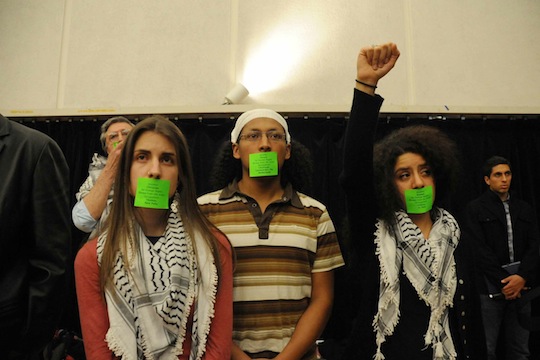
Anti-Semitism is unlike most other forms of hatred, in that it is both a form of bigotry and a false accusation — too often part of a relentless propaganda campaign aimed at silencing critics of Israel. That’s why defining anti-Semitism correctly is a crucial target for our activism. As with homophobia, misogyny, or anti-black racism, there are always those who demand Jews “get over it” for the supposed good of the movement.
But bigotry is always bad. It is bad for Jews inside the pro-Palestine movement who cannot be required to accept or internalize what is toxic for them; it is bad for attracting Jews from outside the movement; and it provides plenty of ammunition for those seeking to silence Palestine solidarity activism by equating it with anti-Semitism. Because the hatred of Jews bred Zionism and all the hardships it brought upon Palestinians, ignoring the issue actually ends up harming the latter. In short, accurately calling out anti-Semitism isn’t a distraction – it’s a gift that can deeply contribute to the health of any political group.
Jews For Racial and Economic Justice’s (JFREJ) new booklet, “Understanding Antisemitism: An Offering to Our Movement,” does a good job of defining anti-Semitism as an ideology that uses lies and stereotypes about Jews in order to blame them for society’s problems. The booklet provides a rich outline of Jewish history, does not whitewash Zionism, and delineates the ways in which some Jews enjoy white privilege.
What remains missing, however, is a how-to guide: not information on what anti-Semitism is, but a demonstration of how to recognize and call it out if necessary. Confronting anti-Semitism is trickier than it sounds; it is a skill that people can eventually master, yet they are likely to make plenty of mistakes on the way. I hope to address these questions based on my own experience as an Israeli Jew in the pro-Palestine movement in the U.S. between 2006 and 2013.
Here are some of the mistakes I made until I became better at distinguishing between genuine anti-Jewish bigotry and certain forms of speech that made me uncomfortable.
I joined the UC Berkeley chapter of Students for Justice in Palestine (SJP) in 2006 because I identified with its goals. That doesn’t mean that the anti-Palestinian prejudices I acquired from growing up in Israel immediately disappeared, however. The most glaring example was the right of return for Palestinian refugees, an issue that is taboo in Israel and which I had never thought a lot about. I noticed my Palestinian colleagues referring to it often, which made me feel conflicted.
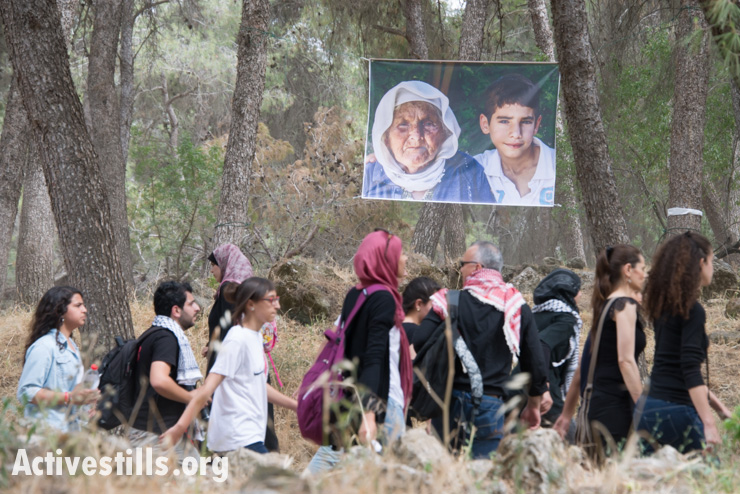
On the one hand, they seemed genuinely accepting of me as an Israeli Jew. On the other hand, I had a vague feeling that the idea of Palestinian refugees returning to their homeland implied violence against Israelis. Didn’t they want to violently drive us out? Wasn’t this the only way to interpret the phrase? I eventually approached some non-Palestinian Arab members of the group, who were quite surprised, almost amused, that this was my interpretation. Of course Palestinians returning to their homeland didn’t have to mean expelling the current Jewish inhabitants. From then on, I started to make the right of return a central part of my advocacy work.
This misunderstanding was far from a coincidence. Coming from Israel meant coming from a place where endless state violence is completely normalized, while any form of resistance is pathologized as barbaric. Leila Khaled, who hijacked planes to raise awareness for her people’s plight, and who never killed anyone, was a feminist hero for many of my friends. I initially found that idea much more shocking than the fact that most Israelis I knew admired and voted for ex-generals who actually did have the blood of civilians on their hands. This urge to pathologize Palestinians as unusually violent came up again and again. It took me years to unlearn it.
Another reason for such sentiments was my own exposure to propaganda. It was only after I became active in Berkeley that I gradually became aware of the power of the hasbara (Israeli state-sponsored PR) machine that Israel and its supporters use against Palestinian and pro-Palestinian activists in the U.S. Once I did, I learned that it was highly useful for hasbara groups to label us as anti-Jewish; doing so enabled them to mobilize the wider Jewish community by playing on its fears. It captivated their donors’ attention, helped them build legal cases against our activities, and got them media coverage. This forced me to do proper research about potential speakers, to make sure that their words couldn’t be used to smear us.
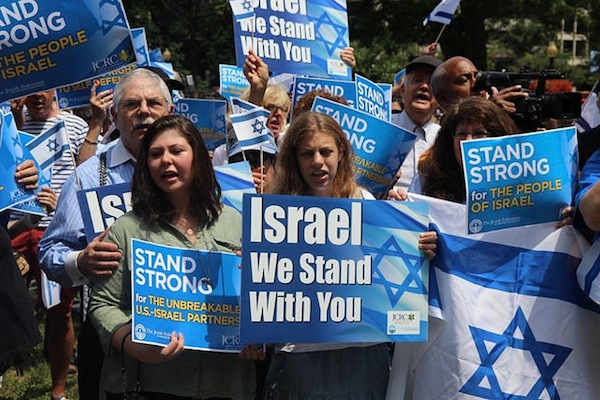
In 2007, far-right Zionist students on campus formed their own club in response to our successes. At the core of this new club were students trained and paid by donors to defend the policies of the State of Israel. The university administration was always eager for “dialogue” to prevent what they saw as a potential PR disaster; they constantly lectured us about tolerance without fully understanding who we were or what we were fighting for. At their request, representatives from both groups held a meeting.
At the meeting, we were told that our actions were anti-Semitic and had made Jewish students on campus feel unsafe. I could see the surprise, even the anguish, on the faces of the people in my group. What had we done? First, said the pro-Israel students, we displayed a wooden map of Palestine with hooks representing destroyed villages and towns during one of our protests. The map was painted in the colors of the Palestinian flag. Didn’t this mean we wanted to expel Jews from Israel?
“No,” we responded. This was a map of historical Palestine, representing a past injustice we wanted to correct, without any wish to expel anyone in the future. However, in order to accommodate them, from now on we would put up a large sign reading “Historical Palestine” near our map, clarifying that it was not meant to threaten anyone.
What else? There was our chant, “From the River to the Sea, Palestine Will Be Free.” Didn’t we mean we wanted Palestine to be free of Jews, that is — a new Holocaust? Of course not. We meant freedom for everyone. But just to make sure we weren’t misunderstood, we promised to stop using this chant. Those were two big concessions we offered. Anything more?
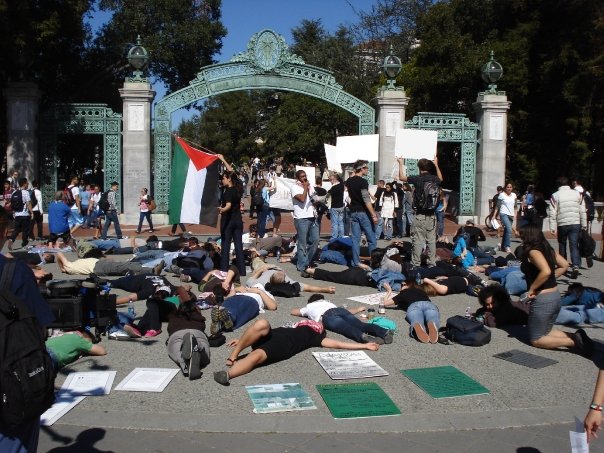
Yes. Our speakers criticized the Israel lobby. This was also anti-Semitic. The Zionist students wanted us to have different speakers.
By the end of the meeting my friends were holding back tears. We had gone out of our way to be sensitive, taking the claim of Jewish safety seriously, while ignoring the politics these lobby groups were trained to promote. We realized, however, that what they wanted was not merely consideration or sensitivity. It was our very presence that offended them. Rather than relating to us as people, we were being treated as household appliances that had malfunctioned: we weren’t providing them with the expected level of comfort.
In 2010 our chapter campaigned for the student senate to back a bill calling on UC Berkeley to divest from American companies profiting from the occupation. The senate held three long debates on the bill, during which sobbing pro-Israel students repeatedly declared they would feel unwelcome on our campus if the resolution were passed.
After one of the debates, we found leaflets with talking points that had been left behind by pro-Israel organizers. Titled “Unifying Strategies for Our Jewish Community,” the document suggested that students “Make it personal, include personal experiences and emphasize feelings of personal attack. BE EMOTIONAL. Don’t be afraid to show how you feel (angry, sad, etc.)… DON’T try to deconstruct the bill. DON’T focus on addressing the fallacies/specifics of the bill. Instead, focus on how it is an attack on the Jewish community. AVOID a debate on the Middle East. Supporters of the bill would like to argue on this platform.” We had heard all those points in the Zionist students’ statements earlier in the evening.
During the debates, our opponents made sure to “translate” phrases we used into familiar anti-Semitic tropes in order to smear us (I later dubbed this “anti-Semitizing”). I spoke against air strikes by the Israeli Air Force on Gaza (using weapons produced by those same American companies), mentioning that many children had been killed. Opponents of the bill, however, pretended I had said, “the Jews killed children,” which was akin to a “medieval blood libel.” Just as the talking points recommended, the opponents avoided discussing the troubling information I had brought up, and reframed my words as “an attack on the Jewish community.” Several Jewish students that I knew began distancing themselves from me, saying they were offended by what I had supposedly said. Our divestment bill passed with a clear majority before being vetoed by the president of the student senate. A similar bill eventually passed in 2013.
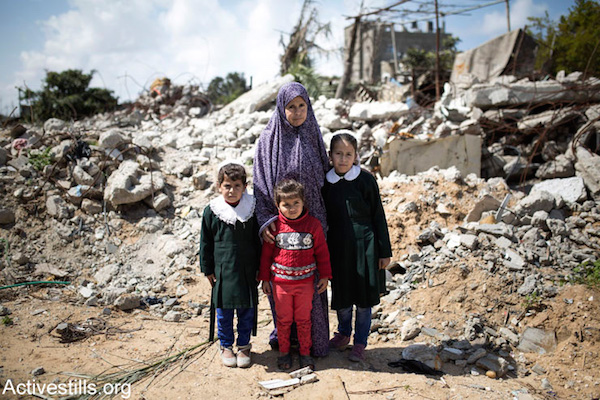
For me, this was a turning point. I had never realized the depth of emotional manipulation the Israel lobby was willing to employ in order to achieve its aims. The reckless deployment of the anti-Semitism charge risked de-sensitizing anyone who opposed their politics. In other words, the lobby wanted to defend the Israeli government so badly that it was willing to sacrifice the fight against actual anti-Semitism.
One important lesson was for us to make Jewish solidarity with Palestinians visible and vocal (though, importantly, without overshadowing Palestinian testimonies). While pro-Israel lobbyists had attempted to portray the Jewish community as unified in opposition to the bill, numerous community members, as well as several brave students, spoke in favor of it, while many signed a petition in support. After three years in SJP I now had several Palestinian friends, and expressing full and unconditional solidarity with them became a powerful way of simultaneously advancing our cause while combating anti-Semitism. The two issues really were linked.
I now began to think of anti-Semitism independently, regardless of the lobby’s definitions. When one of our allies confused the terms “Jews” and “Zionists,” I wrote a long letter to my colleagues about the differences between the two. In general, most of the pro-Palestine activists were adept at making the distinction, unlike our opponents who always tried to blur it.
One day during the height of the Arab Spring protests, we heard that the Muslim Student Association intended to host a local preacher who had spoken up against state violence in Egypt. After years of following controversies in other student groups, I now had a working knowledge of questionable figures, and his name sounded familiar.
Google affirmed my suspicion – this was Amir Abdul Malik Ali, who had spoken at UC Irvine a few years earlier. In a secretly taped speech, he had claimed “Zionist Jews” were behind a series of violent incidents attributed to Muslims, including 9/11, and that these same Jews owned the media (he erroneously counted Rupert Murdoch as a Jew). I first watched the videos carefully and tried to ascertain he wasn’t being misquoted, and then my group contacted the Muslim students, who immediately canceled the talk. Since then, Abdul Malik Ali has never been invited back to speak, and we were taken seriously after demonstrating that we did not conflate anti-Semitism with opposition to Israel’s policies.
In a separate incident, after I found materials romanticizing the pogroms of Jews on pro-Palestine activist Alison Weir’s website, the Muslim Students Association also agreed not to host her. A few years later, in 2015, Weir was expelled from a leading BDS coalition for making and disseminating a series of anti-Semitic claims, including blaming Jews for anti-Semitism. The subsequent debate also exposed me to a lot of internalized antisemitism: older Jewish activists who insisted we cannot talk about her statements until the occupation ends.
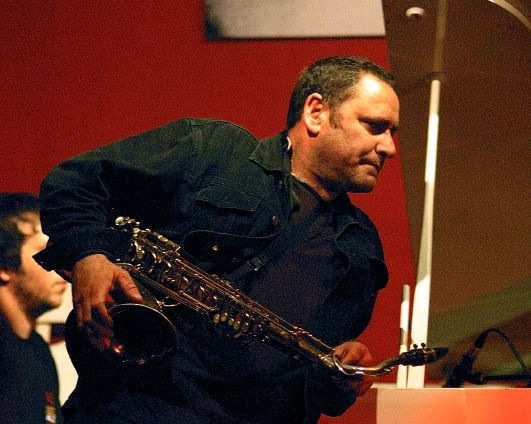
The most celebrated call-out of an anti-Jewish figure in pro-Palestine circles was the 2012 statement on Gilad Atzmon. Atzmon, born an Israeli Jew, became a Holocaust denier and a supporter of “national socialism.” Yet through his obfuscating language and pseudo-intellectual rhetoric, he had managed to make inroads and win allies within the pro-Palestine movement (including Weir). Years of Zionists crying wolf had made too many Palestine activists insensitive to the presence of a real anti-Semite. While a few Jewish activists had been sounding the alarm for years, they were usually accused of being “Zionists” or “crypto-Zionists,” in an attempt to bully them into silence.
The tide turned after the publication of a landmark statement against him by dozens of Palestinian activists, many of them leading figures in the BDS movement, in which they wrote that “challenging Zionism, including the illegitimate power of institutions that support the oppression of Palestinians, and the illegitimate use of Jewish identities to protect and legitimize oppression, must never become an attack on Jewish identities.”
Despite their people’s suffering at the hands of Israeli Jews and bullying by pro-Israel groups in the U.S., the Palestinian organizers that I know are generous and open-minded, fully aware of the difference between Judaism and Zionism, and determined to stand up against genuine anti-Jewish bigotry without having to be prompted to do so. I often wondered why so few people outside the movement were aware of this deep kindness that exists against all odds.
This is true not only for Palestinians. In general, I have found that Arab and Muslim activists who have grown up in the U.S. become aware from an early age of what anti-Semitism is, and of the heavy price they pay by being accused of it. The real problem, in my experience, is privileged white activists like Weir and most of her defenders – those who have rarely faced consequences for their words, and who maintain social ties with white supremacists. Contrary to what Israel lobbyists claim, the BDS movement has been instrumental in decreasing the influence of these anti-Jewish white activists on the pro-Palestine Left.
By the end of my time in the UC Berkeley chapter of Students for Justice in Palestine, I felt I had a list of what I considered serious anti-Jewish tropes that I was willing to confront others about. I had reflected sufficiently on my own position such that I did not get easily triggered by words that supposedly connoted Palestinian violence; I had a working knowledge of problematic speakers whose comments would reflect badly on us if we hosted them; and most importantly, I knew I wasn’t doing this work alone. My Palestinian, Arab and other non-Jewish comrades really had my back. When they encountered anti-Jewish statements, they would speak up without my having to ask them. Despite the deluge of misleading hasbara, our humanity had remained intact, and we were ready to take on all forms of bigotry as part of the journey to free Palestine.
*Correction: A previous version of this article stated that Gilad Atzmon was an active proponent of Nazism. That wording has been amended to reflect Atzmon’s support for “national socialism,” along with a link to substantiate that claim. A link has also been added to substantiate the claim that he is a Holocaust denier.
Tom Pessah is a sociologist and activist.
